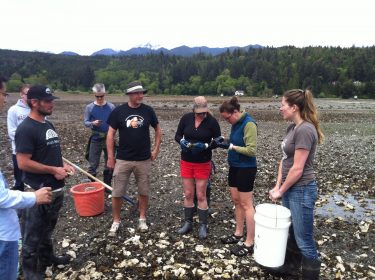
Can tapping into West Coast fisheries support human health and nutrition? With an inaugural pilot grant from UW’s Population Health Initiative, a multidisciplinary research team is studying how the fish we catch could support healthier diets for low-income communities. Dr. Edward Allison, School of Marine and Environmental Affairs, and PhD student Zach Koehn, School of Aquatic and Fisheries Sciences, are leading the work in partnership with Jen Otten, School of Public Health, and Ray Hilborn and Chris Anderson, also from the School of Aquatic and Fishery Sciences.
Nutritious oily fishes, such as mackerel, herring and sardines, contain high levels of heart-healthy Omega-3 fatty acids that are unique to marine species. Right now, Allison explains, West Coast fisheries do not target most of these small “fishy flavored” species because of consumer taste preferences and economic incentives to catch a few popular species, like halibut and rockfish. When they are caught, these fish are sold for animal and aquaculture feed or discarded as bycatch. However, the West Coast is home to many peoples from traditional maritime cultures who would welcome the inexpensive fish into their diets.
Allison’s team, comprised of fisheries, public health and policy scientists, sees an opportunity to connect low-income communities with these healthy, more affordable fish.
“Good quality, nutritious food can be inexpensive,” Allison says. “Our work is part of a movement to democratize local food movements and make them more accessible to more people.”
Allison hopes that his team’s research will: determine West Coast fisheries’ potential to support population health in local coastal communities; name current barriers that prevent nutritious, underused fish from reaching people who need them; and explore possible pathways to connect fisheries with communities — like having small community-supported fisheries deliver their bycatch to schools and meal programs. If the team identifies fishing policy and practice changes that could increase the supply of nutritious fish, those pathways could create new opportunities for organizations like SeaShare, a nonprofit that currently partners with fishermen to donate unsold fish to food banks.
Managing fisheries for nutrition could also have positive environmental impacts.
“Right now, we target a very specific number of species and thus take large chunks out of the ecosystem,” says Allison. “We have a huge diversity of fishes on the West Coast. There are a lot of edible things out there. It’s possible that by fishing for more species or more ages of fish overall, we could take smaller amounts of each kind from the ocean, which would have a less dramatic impact than removing, say, just the larger fish in the marine system.”
The Population Health Initiative pilot research grant encourages new interdisciplinary collaborations among investigators for projects that address critical components of the grand challenges the UW seeks to address in population health. This year’s five awardees were selected by a panel of judges from a pool of 60 applications from faculty investigators representing the UW Bothell and UW Tacoma campuses as well as every school and college on the UW Seattle Campus.

